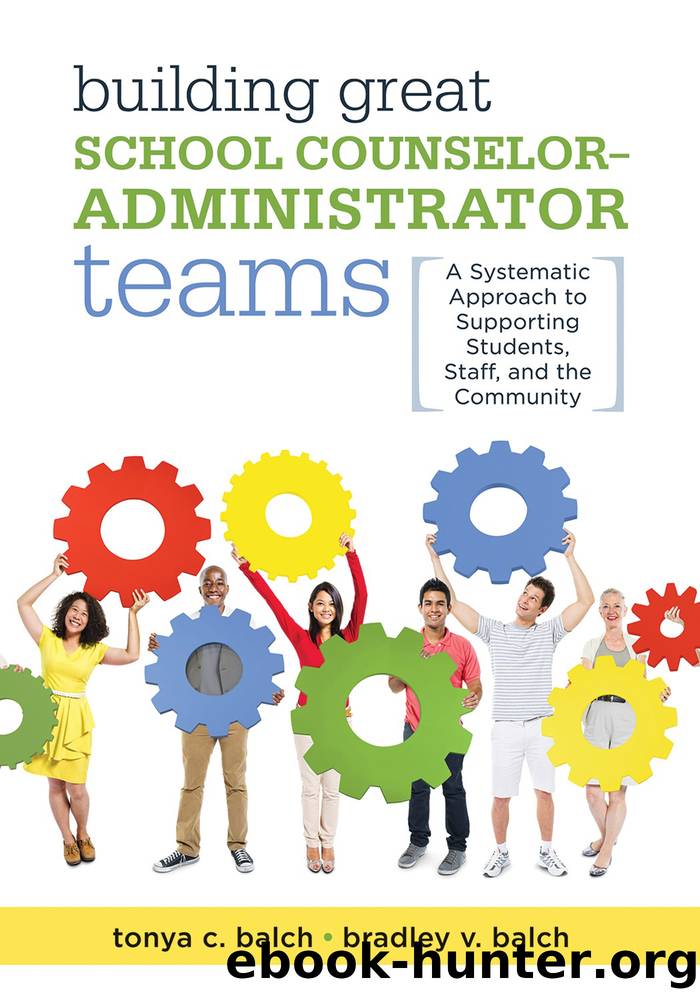Building Great School Counselor-Administrator Teams by Balch Tonya C.;Balch Bradley V.;

Author:Balch, Tonya C.;Balch, Bradley V.;
Language: eng
Format: epub
Publisher: Solution Tree
Published: 2019-08-15T00:00:00+00:00
Growth Mindset and Resilience
School counselors and administrators have the opportunity to intervene and foster growth and resilience so students can thrive despite challenging life experiences. A growth mindset does not see failure as a setback but an opportunity to grow (Dweck, 2006). Imagine a student with a growth mindset scored poorly on a mathematics exam. Instead of thinking, âIâll never get this! Iâm just not good at math,â he or she would think about what to do differently. Students with a growth mindset are problem solvers. This fosters resilience, as students do not focus on their current situation but work toward solutions. Resilience helps a person endure and recover from difficult circumstances. It aids students coping with grief, trauma, loss, threats, health issues, and other ACEs (Arif & Mirza, 2017).
Teaching students how their brains work and change during learning can be a powerful motivating factor for them (Robinson, 2017). This understanding gives students a sense of control and autonomy. Encouraging students to take academic risks and challenging their negative self-talk both foster resilience. Understanding a studentâs risk factors and protective factors will help the school counselorâadministrator team develop a plan to foster resilience in that student.
Numerous books, articles, and websites provide examples of how educators can foster a growth mindset. The following resources can help your team encourage a studentâs growth mindset. Visit go.SolutionTree.com/leadership to access live links to the websites mentioned in this book.
â Brainology for Schools (www.mindsetworks.com/programs/brainology-for-schools) is a blended learning curriculum that teaches students how to develop a growth mindset. The program includes online animated instructional units and offline classroom activities.
â MindsetMaker (www.mindsetworks.com/programs/mindsetmaker) is an online professional development course that teaches educators and staff the foundation of a growth mindset and provides resources to help them cultivate a growth mindset culture in their school.
â LeaderKit (www.mindsetworks.com/programs/leaderkit) has activities for grades 4â12 that help school leaders to foster growth mindset across a school. Though the websiteâs primarily classroom focused, the activities work with individual students or small groups. This program, like Brainology for Schools and MindsetMaker, is by well-known educators Carol S. Dweck and Lisa S. Blackwell.
â ClassDojo (https://ideas.classdojo.com/b/growth-mindset) and Stanfordâs Project for Education Research That Scales (PERTS) Research Center teamed up to create the first season of The Mojo Show. The five-episode video series highlights how anyone can learn to have a growth mindset (ClassDojo, n.d.). Activities are primarily for kindergarten to grade 5, but could be adapted for grades 6â8 and small groups.
â KidsHealth (http://kidshealth.org/en/kids/brain.html) teaches students how the brain works. Understanding that they can rewire their brains and increase intelligence engages students. They become less afraid of failure and develop growth mindset this way. A video, a quiz, and other activities for grades 5â12 are mainly for individual students, but could be adapted for classrooms or small groups.
The school counselorâadministrator team can use these resources to encourage a school climate that is proactive and supports students with ACEs. Your team might do a group study of books such as the previously mentioned Mindset: The New
Download
This site does not store any files on its server. We only index and link to content provided by other sites. Please contact the content providers to delete copyright contents if any and email us, we'll remove relevant links or contents immediately.
Macmillan Primary Grammar 2 Pupil's Book by Unknown(377)
Figuring Out Fluency in Mathematics Teaching and Learning, Grades K-8 by Jennifer M. Bay-Williams & John J. SanGiovanni(342)
The Principal's Guide to Curriculum Leadership by Sorenson Richard D.;Goldsmith Lloyd M.;Mendez Zulma Y.;Maxwell Karen T.;(265)
English Grammar Practice--The Noun by Roxana Nastase(228)
Learning from Accidents 3rd ed by Trevor Kletz (2001)(226)
Harnessing Technology for Deeper Learning by Scott McLeod(214)
Text-Dependent Questions, Grades K-5 by Douglas Fisher & Nancy Frey & Heather Anderson & Marisol Thayre(208)
A Guide to Curriculum Mapping by Hale Janet A.;(202)
English Language Program Administration by Unknown(199)
Deep Change Leadership by Reeves Douglas;(189)
How to Do Everything with Google Tools by Unknown(188)
The Grammar Teacher's Activity-a-Day by Jack Umstatter(177)
The Power of SMART Goals by Conzemius Anne;O'Neill Jan; & Anne Conzemius(175)
Beyond the RTI Pyramid by Bender William N.;(158)
Aligning and Balancing the Standards-Based Curriculum by Squires David A.;(156)
Using Data to Close the Achievement Gap by Johnson Ruth S.;(156)
Using Equity Audits to Create Equitable and Excellent Schools by Skrla Linda E.;McKenzie Kathryn B.;Scheurich James Joseph;(151)
Differentiated Instructional Strategies for the Block Schedule by Gregory Gayle H.;Herndon Lynne E.; & Lynne E. Herndon(144)
You've Got to Reach Them to Teach Them by Schreck Mary Kim; & Schreck(140)
